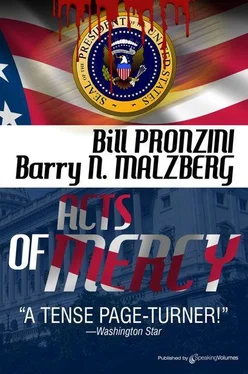Bill Pronzini - Acts of Mercy
Здесь есть возможность читать онлайн «Bill Pronzini - Acts of Mercy» весь текст электронной книги совершенно бесплатно (целиком полную версию без сокращений). В некоторых случаях можно слушать аудио, скачать через торрент в формате fb2 и присутствует краткое содержание. Жанр: Триллер, на английском языке. Описание произведения, (предисловие) а так же отзывы посетителей доступны на портале библиотеки ЛибКат.
- Название:Acts of Mercy
- Автор:
- Жанр:
- Год:неизвестен
- ISBN:нет данных
- Рейтинг книги:4 / 5. Голосов: 1
-
Избранное:Добавить в избранное
- Отзывы:
-
Ваша оценка:
- 80
- 1
- 2
- 3
- 4
- 5
Acts of Mercy: краткое содержание, описание и аннотация
Предлагаем к чтению аннотацию, описание, краткое содержание или предисловие (зависит от того, что написал сам автор книги «Acts of Mercy»). Если вы не нашли необходимую информацию о книге — напишите в комментариях, мы постараемся отыскать её.
Acts of Mercy — читать онлайн бесплатно полную книгу (весь текст) целиком
Ниже представлен текст книги, разбитый по страницам. Система сохранения места последней прочитанной страницы, позволяет с удобством читать онлайн бесплатно книгу «Acts of Mercy», без необходимости каждый раз заново искать на чём Вы остановились. Поставьте закладку, и сможете в любой момент перейти на страницу, на которой закончили чтение.
Интервал:
Закладка:
He was only part of the conspiracy, perhaps its leader but more probably, in retrospect, its point man. There are still others involved, in any case, and before the plot can be effectively neutralized these others, too, must be eliminated. You cannot nullify a cancer by killing one of its cells; you must kill them all, every last one.
But who are they? We are not quite sure yet; we can make educated guesses, but guesses are not enough-we must be absolutely certain. Peter Kineen is a major part of the conspiracy, of course; the President, however, recognizes him as an enemy, and he is not nearly so dangerous as those close to Augustine, such as Briggs, who are seeking to undermine and destroy him from within. Kineen must die, yes, but the others, the ones still hidden, must die first.
We will be even more vigilant and cunning from now on. And when we become sure of each of the remaining traitors, we will strike as we struck with Briggs. Swiftly, vengefully, and in the name of righteousness.
Oh yes, oh yes, our acts of mercy have only just begun.
Three
Harper made his way awkwardly along the swaying corridors from the club car toward the aides’ Pullman. Trains, he thought with distaste. Great lumbering anachronisms totally devoid of dignity, with no effective function in the last two decades of the twentieth century. Lower-class conveyances like buses and streetcars. Playthings for men such as Augustine who had never quite outgrown the toys and fascinations of childhood. All in all, a preposterous mode of transportation for the President of the United States, and for a man like himself whose sensibilities were offended by their superfluous nature.
The motion of the train had given him a sour stomach, and the glass of plain soda he had consumed in the club car made him belch again, delicately. He had spent fifteen minutes in the club car, brooding at one of the tables and watching flickers of sunlight play stroboscopically on its surface, but then restlessness had brought him to his feet and sent him out of there, just as it had brought him into the car in the first place.
Why had Augustine moved up the date of their departure for The Hollows from the weekend to today? Was it because of the media reaction to his ill-timed joke about the Vice-President’s problems in the West? Because of the Indian crisis and his inability to cope with it? Or had something else happened, something of which Harper had not yet been made aware? The suddenness of this change in plans-Harper had learned about it only this morning, when he arrived at the White House-carried suspicious overtones. As did Augustine’s refusal to talk to him in Washington and on the plane. As did the President’s haggard, moody aspect. As did the First Lady’s uncharacteristic reticence today, the bluish lines of fatigue under her eyes that she had not quite been able to conceal with makeup.
There were more people in the corridors now-stewards (none of whom were black: a kind of reverse racism, Harper thought ironically), other aides, and Secret Servicemen who could not quite maintain either their regimentation or their inconspicuousness in these closed surroundings. He ignored them individually, still brooding. But when he neared his compartment, at the upper end of the aides’ Pullman adjacent to U.S. Car Number One, he saw through the connecting door glass that the First Lady was standing in the doorway of her private drawing room, talking to her confidential secretary, Elizabeth Miller. He hesitated, and then, on impulse, he walked through into Car Number One.
As he entered, Elizabeth Miller was saying, “Do you want me to have a steward bring us some coffee, Mrs. Augustine?” Claire nodded, started to retreat into the drawing room. Harper called, “Mrs. Augustine,” and she stopped and seemed to stiffen, turning her head to look at him. Elizabeth paused, as if there was something she wanted to say to Harper, but he moved past her without a glance. He did not particularly care for the woman: she was another cipher like Justice.
His first thought as he came to Claire was that even the marks of fatigue did not detract from her beauty. But then his eyes met hers-and what he saw reflected there reversed his smile into a startled frown.
It was something that might have been fear.
She looked past him at the secretary, said sharply, “Don’t just stand there, Elizabeth, see about the coffee,” and then put her eyes on him again as Elizabeth Miller left the car.
Harper began, “Mrs. Augustine-”
“I haven’t time to talk now…”
“But I was just-”
“Please, not now,” she said, and before he could speak again she stepped back and pushed the door shut. Its lock clicked an instant later, like a protective barrier being snapped into place.
Nonplussed, Harper stood alone in the corridor and listened to the monotonous rhythm of the train’s wheels, to the uneasy rhythm of his thoughts. Her reactions to him were sometimes mutable, yes, but never before had she seemed frightened of him. Her attitude just now made no sense. Why should she be afraid of him, of all people?
Why should she be afraid of him?
Four
In his small compartment in the security’s Pullman, Justice sat trying to read the copy of Murder on the Calais Coach he had bought in Washington. And finding it dull and uninteresting. It was not the book itself, though; he knew he would have the same reaction to any mystery novel he tried to read today. After what he had done with Briggs’s body last night, the fictional exploits of criminals and detectives-the imaginary dilemmas of imaginary people-took on a kind of pallid irrelevency.
Justice closed the book, rubbed at his tired eyes. Why hadn’t Briggs been found? he asked himself again. He had been waiting for that to happen all day, and yet it hadn’t or word would have come to the President immediately. Somebody had to find the body before long, that seemed sure: there were colleagues at the White House who would question his unexplained absence from work, friends who might investigate when appointments were not kept.
And when Briggs was found, what then? Had he overlooked something after all in the Cleveland Park house that would tell the homicide detectives and the forensic experts that the press secretary had not died in his bathroom? If so, would they then suspect foul play? Christ, Justice thought, that would make things even worse for the President than if they had simply reported the death at the White House. The ultimate irony: an accidental death manipulated and mishandled so badly that it was thought of as homicide.
But even if anything like that happened, the trail could lead only to him. Where it would end because he would never reveal the truth, would never betray the President or his oath of silence.
Justice raised the novel again, looked at the spine, and then tossed it onto the seat opposite without reopening it. He wondered if he should go out of there, find something or someone to occupy his time and his mind. A drink in the club car, or a predinner snack from the buffet in the dining car, or a nap, or a look at the view from the observation platform, or conversation with some of the other Secret Service agents. Only none of these things appealed to him. He did not feel like doing anything at all.
After a time he slid over next to the window, watched inanimate objects appear and disappear outside as the train sped northeast out of Los Angeles. Even the pleasure he usually felt at being on the Presidential Special was absent; he was merely riding on a transportation vehicle, like Air Force One earlier, that was taking him from one point to another. Taking all of them to The Hollows again as it had so many times in the past.
When would Briggs be found?
Читать дальшеИнтервал:
Закладка:
Похожие книги на «Acts of Mercy»
Представляем Вашему вниманию похожие книги на «Acts of Mercy» списком для выбора. Мы отобрали схожую по названию и смыслу литературу в надежде предоставить читателям больше вариантов отыскать новые, интересные, ещё непрочитанные произведения.
Обсуждение, отзывы о книге «Acts of Mercy» и просто собственные мнения читателей. Оставьте ваши комментарии, напишите, что Вы думаете о произведении, его смысле или главных героях. Укажите что конкретно понравилось, а что нет, и почему Вы так считаете.












